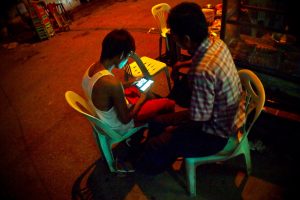Myanmar’s military government is mulling a new suite of cyber-security laws that seem designed to restrict the ongoing mobilization of its opponents, according to a coalition of local civil society organizations.
In a statement issued on February 11, the government gave 36 pages outlining the proposed laws to mobile operators and telecommunications license holders for comment on February 9, eight days after the army overthrew the elected government led by the National League for Democracy.
“The ‘bill’ includes clauses which violate human rights including the rights to freedom of expression, data protection and privacy, and other democratic principles,” the coalition said in its statement. It added that the bill was clearly “drafted by the current military regime to oppress those who are against its rule, and to restrict the mobilization and momentum of online resistance.”
According to Reuters, which obtained a copy of the draft bill, its avowed aims include protecting the public and preventing the use of electronic technology to harm the state or its stability. It gives the authorities the power to compel internet providers to prevent or remove any content deemed to “cause hatred, destroy unity and tranquility,” any “untruthful news or rumors,” or anything that it considers “inappropriate” to Myanmar’s culture. The broad wording of many of these categories, to say nothing of the prejudicial interpretations likely to be offered by the courts, would allow the junta to ban pretty much any content that it dislikes, as well as the power to intercept data from local internet service providers.
Local civil society groups were joined in their condemnation by the Asia Internet Coalition (AIC), whose members include Apple, Facebook, Google and Amazon, which said that the proposed bill would give the military government unprecedented censorship powers and violate privacy, while contravening the right to freedom of expression.
“This would significantly undermine freedom of expression and represents a regressive step after years of progress,” the AIC said in a statement. “We urge the military leaders to consider the potentially devastating consequences of these proposed laws on Myanmar’s people and economy.”
The Myanmar government has been considering cyber-security legislation for some time – a draft framework was circulated for comments in 2019 – but the law is a clear reaction to the rising protests against the military’s seizure of power on February 1.
Social media networks – mostly Facebook, but increasingly Twitter – have been vital to the Civil Disobedience Movement that has rapidly coalesced in resistance to the coup. They are also a key point of difference with past mass demonstration in Myanmar, such as the 2007 “Saffron Revolution,” when those few foreign journalists who were present struggled to get their photos and footage out of the country. The current protests have been accompanied by a flood of footage and information posted online, fostering instant linkages across time and space.
The government clearly recognizes the challenges posted by digital technologies and social media. It imposed a 24-hour internet blackout directly after the coup, and continues to restrict access to key social media networks (although many people have learned to circumvent the controls using Virtual Private Networks.)
Perhaps having found a complete internet shutdown a step too far, the junta is now equipping itself with the requisite legal tools to begin clamping down on online communications. Coming amid a series of raids on the night of February 10 that resulted in the arrest of senior political figures and election officials, it is a sign that the junta, like its predecessors, has little intention of compromising with its opponents.

































